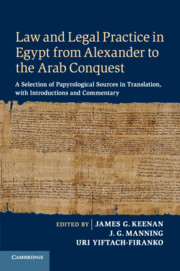 Law and Legal Practice in Egypt from Alexander to the Arab Conquest
Law and Legal Practice in Egypt from Alexander to the Arab Conquest Published online by Cambridge University Press: 05 May 2014
The study of ancient law has blossomed in recent years. In the English language alone there have been dozens of monograph-length studies devoted to classical Greek and Roman law, to the Roman legal codes, and to the legal traditions of the ancient Near East including ancient Egyptian, biblical, and Coptic law, among many other topics. In 1995, an important conference was held at the University of California at Berkeley’s law school (Boalt Hall) that brought together specialists in ancient legal documents and legal historians (Chicago-Kent Law Review 70–71 [1995]). Among the many important outcomes of that conference, two stand out. The first was the realization that ancient legal sources have value outside of the realm of those who specialize in the language and scripts of the ancient texts themselves. The second, and more immediately important, outcome for this volume was that pre-Roman legal systems could and indeed should be studied out from under the shadow of Roman law.
Legal documents written on papyrus began to be published in some abundance by the end of the nineteenth century – not of course in time to be used by Henry Maine in his great Ancient Law: Its Connection with the Early History of Society, and Its Relation to Modern Ideas (1861). Even after a substantial history of publication down to the present time, however, legal papyri have not received due attention from legal historians, and have only gradually been incorporated into broader synthetic work. The legal papyri remain by and large in their own world although that world has now expanded beyond the Nile River valley. The legal texts from Egypt, taken as a whole, are among the most valuable records from antiquity for the study of the ancient law, the ancient economy, and for social history more broadly. But that greater value of the papyri has often been lost in the technical occupation of publishing and correcting and commenting on an ever-growing corpus of documents. The papyri are the raw material of history and the basis of institutional analysis, but the underlying questions, often unstated and problematic, usually center around questions like: what kind of history, and whose? This in turn relates to the bigger question of the presumptive status of Egypt in the Hellenistic and Roman periods as a place “set apart,” and therefore easily dismissed as merely an unusual, if embarrassingly well-documented, part of the Mediterranean world.
To save this book to your Kindle, first ensure no-reply@cambridge.org is added to your Approved Personal Document E-mail List under your Personal Document Settings on the Manage Your Content and Devices page of your Amazon account. Then enter the ‘name’ part of your Kindle email address below. Find out more about saving to your Kindle.
Note you can select to save to either the @free.kindle.com or @kindle.com variations. ‘@free.kindle.com’ emails are free but can only be saved to your device when it is connected to wi-fi. ‘@kindle.com’ emails can be delivered even when you are not connected to wi-fi, but note that service fees apply.
Find out more about the Kindle Personal Document Service.
To save content items to your account, please confirm that you agree to abide by our usage policies. If this is the first time you use this feature, you will be asked to authorise Cambridge Core to connect with your account. Find out more about saving content to Dropbox.
To save content items to your account, please confirm that you agree to abide by our usage policies. If this is the first time you use this feature, you will be asked to authorise Cambridge Core to connect with your account. Find out more about saving content to Google Drive.